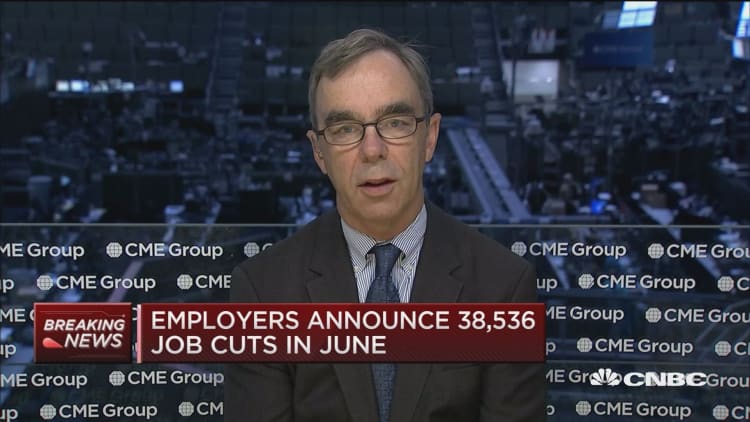
Layoffs by U.S. employers in the first half of 2016 outpaced job cuts during the same period last year, but payroll reductions are beginning to trail off, outplacement firm Challenger, Gray & Christmas reported Thursday.
In June, employers said they planned to hand out 38,536 pink slips, according to the latest Challenger report. That marked a slight uptick from job cuts announced in May, but Challenger notes the June figure is below the 12-month average, indicating a "positive employment environment."
"Just like the job creation numbers have been low in this second quarter, also the layoffs are low, so that is kind of a signal that we're nearing full employment," John A. Challenger, CEO of Challenger, Gray & Christmas told CNBC's "Squawk Box" on Thursday.
"Companies are just holding onto their people. They're not laying off even their C players, but there's just not that many people to hire either," he said.
Employers announced 313,754 layoffs in the first six months of 2016, up 9 percent from the same period last year.
Still, payroll reductions tapered between the first and second quarters. Second-quarter job cuts totaled 132,834, down 27 percent from the 180,920 layoffs announced in the first quarter.
In the hard-hit energy sector, employers cut 42 percent fewer jobs in the second quarter. Retail, another leading job-cutter, saw a 48 percent drop in pink slips.
The computer industry continued to take it on the chin. Payroll reductions in the first six months of the year were more than triple those seen during the first half of 2015.
Challenger said the reduced pace of job cuts may persist as employers take a wait-and-see approach.
"Several uncertainties, including national elections, the recent Brexit, and global security and economic issues are giving employers pause when it comes to workforce decisions," Challenger said in the report.
The Challenger report comes a day before the Labor Department releases its April jobs data.



